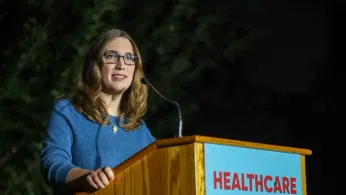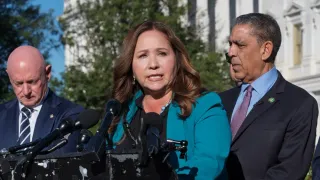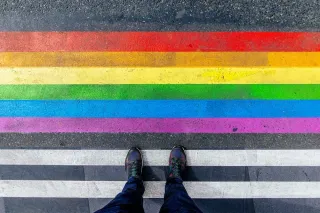
3 hours ago
Sarah McBride’s “Bisexual Big Tent”: How Queer Joy and Coalition-Building Are Reshaping American Politics
READ TIME: 3 MIN.
Picture this: Crooked Con, a sea of progressive voices, anxious about the state of American democracy, and on stage steps Sarah McBride. Delaware’s own history-maker, the first openly transgender member of Congress, and—if we’re being honest—the kind of political rockstar queer kids wish they’d seen on TV growing up. With a wink and a rallying cry, she tells the crowd, “You can’t build a diverse working class coalition if people don’t feel like you like them.” And then, as if channeling the collective yearning of a community forever on the margins, she drops the mic: “The big tent is bisexual” .
This isn’t just a clever turn of phrase. It’s a political philosophy—and a cultural reset—that’s long overdue. As 2026’s high-stakes midterms loom, McBride’s vision is clear: the Democratic Party’s future depends on radical inclusion, not just performative diversity. And for LGBTQ+ Americans, especially the bisexual, pansexual, and fluid folks who often get erased in both politics and Pride, this message lands like a love letter.
Sarah McBride’s journey is legendary in its own right. Elected by Delaware’s famously centrist voters—where, fun fact, only about 4.5% of the population identifies as queer or trans and most are under voting age—McBride’s win was less about identity politics and more about trust. She wasn’t elected *because* she’s trans; she was elected because she listens, delivers, and refuses to let her humanity be weaponized by the opposition .
Her historic firsts are the stuff of rainbow history: first openly transgender member of Congress, highest-ranking openly trans public official in U.S. history, and a survivor of Republican “political theatre” (bathroom bans, name-calling—you know, the usual) . But McBride’s approach is refreshingly un-dramatic: “Delivering on the issues that keep Delawareans up at night,” she told local press, is her real mission. And, as the first freshman Democrat in the 119th Congress to bring a bill to the floor—a bipartisan consumer protection bill, no less—she’s proving that queer leadership isn’t a sideshow, it’s the main event .
So, why does McBride’s “big tent is bisexual” line matter so much? For starters, it’s about more than just sexual orientation. Bisexuality, by its very nature, resists binaries and welcomes fluidity—a fitting metaphor for the kind of coalition-building the Democratic Party needs now more than ever. As McBride told the Crooked Con crowd, “You can’t build a diverse working class coalition if people don’t feel like you like them.” It’s not enough to tolerate difference; we have to celebrate it .
Historically, bisexual people—and other folks whose identities fall between, beyond, or outside the mainstream—have been erased, sidelined, or treated as political afterthoughts. But “bisexual” as a tentpole is a call to action: an insistence that real progress means centering those who are most at risk of being forgotten. In an era when anti-LGBTQ+ backlash is both relentless and well-organized, McBride’s message is more than inclusive rhetoric; it’s a strategic necessity .
If you’ve been following the state of LGBTQ+ rights in America, you know the stakes are high. The 2020 Supreme Court ruling affirmed protections against workplace discrimination for LGBTQ+ people, and a patchwork of state and federal wins have followed . But the opposition’s playbook—bathroom bans, book bans, and attacks on gender-affirming care—shows no signs of relenting.
McBride’s answer? Refuse to be distracted by the circus and focus on what matters: health care, jobs, housing, education, dignity. As she told one interviewer, her interest in politics was “rooted in my own journey to authenticity as a young person, as someone growing up here in Delaware, I was scared. I wondered whether the heart of this country was big enough to love someone like me” .
It’s not just about policy. It’s about queer joy—the radical act of living out loud, of refusing to shrink in the face of hate, and of building coalitions that are as beautifully messy, intersectional, and vibrant as the queer community itself. As McBride reminds us, “We can’t ever go to 10 if we’re always at 10.” Translation: Save your outrage for the real battles, and never forget the power of hope .
McBride’s “bisexual big tent” is more than a slogan; it’s a blueprint for the kind of politics that can win hearts, change minds, and actually deliver for LGBTQ+ Americans. It’s about coalition over co-optation, substance over spectacle, and authenticity over assimilation.
As the 2026 midterms approach, queer voters—and our allies—have a choice: retreat into silos, or join McBride under the big, bisexual tent. Because in the end, the fight for equality isn’t just about who gets a seat at the table—it’s about who gets to set the menu.
And if Sarah McBride has anything to say about it, it’s going to be a feast.






